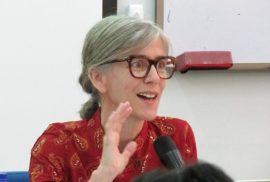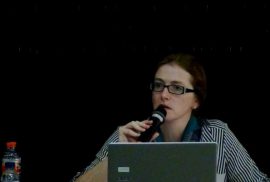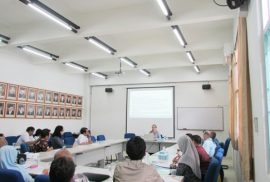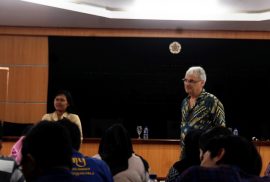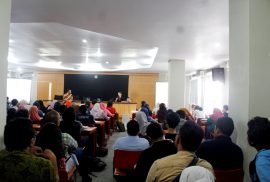Leiden-based senior researcher at the Royal Netherlands Institute of Southeast Asian Caribbean Studies (KITLV), Marieke Bloembergen, on Thursday (20/4) gave a public lecture on India’s scientific networks, religion and spiritual movements. The public lecture was held by the Department of History, FIB UGM, in Meeting Room I, Purbatjaraka Building, FIB UGM. This public lecture has the theme “Beyond A Dutch Empire, Beyond Indonesia? : Scholarly and Religious Networks, Spiritual Movement and Moral Geographies Of Greater India Across Decolonization, 1920’s-1980’s” and was attended by FIB students from various strata.
April
The exploitation of woman as sexual slaves during the Japanese occupation was a series of planned and organized system. During the Greater East Asia war, Japan realized the basic need for soldiers. It was possible at that time to use indigenous women as ‘comfort women’. This was stated by Katherine McGregor in a public lecture held by the Department of History FIB UGM, on Tuesday (25/4), in the Multimedia Room, Margono building lt. 2, FIB UGM.
On that occasion Katherine gave a public lecture with the topic “Piecing Together the Threads of the So-called ‘Comfort Women’ System During the Japanese Occupation of Indonesia”. Katherine, a woman who also a professor at Melbourne University, explained in detail about sexual slavery system during Japanese occupation. “So, what happened to the sexual slavery during Japanese Occupation was something that was planned”, said Katherine.
“Now answer me, is there any category beside literature sociology?” ask Bambang Purwanto to the students of the doctoral program in the Department of History UGM. They explained their plan for the dissertation proposal in front of him. Bambang views their research proposal still has some weakness and is less contextual. This was delivered at the public lecture about dissertation writing themed “From Research Question Proposal to Thesis Writing” on Wednesday (19/04) in Meeting Room I, Poerbatjaraka Building, FIB UGM.
One of the milestones of national revival came from STOVIA. The Javanese medical school became important in the Indonesian nationalist movement. The reason was based on the emergence of Boedi Utomo on May 20, 1908, whose initiators were mostly STOVIA students. This was stated by Prof. Hans Pols from the University of Sidney in a public lecture themed “The Indonesians Medical Profession in the Dutch East Indies: Medicine, Nationalism and Decolonization” by the Department of History UGM on Monday (10/4) at FIB UGM. According to Hans, the medical student at STOVIA at the same time not only learned about health but also about nationalism and the importance of independence. “At that point, then the medical profession had a vital role at that time,” Hans said.
On Monday (3/4) Marjolein van Pagee, the founder of Histori Bersama, had the opportunity to attend a discussion held by the UGM History Department, in the Multimedia room, second floor, Margono building, FIB UGM. Marjolein tells about the Joint History and the historical relationship between the Netherlands and Indonesia. “Indonesia and the Netherlands, admit it or not, they are connected to each other because of colonization, and it’s not a short time,” said Marjolein.
According to Marjolein, a shared understanding of the history of the two countries is very much needed. It is useful for healing the wounds of the two countries’ past. Furthermore, the woman who studied colonial history at Leiden University explained the reason for the presence of the Joint History. The foundation exists as a bridge connecting the two countries. In the end, Marjoleine hopes that what she does can help to avoid the misunderstanding of the history of the two countries that is still ongoing. For him, true reconciliation comes after understanding.

